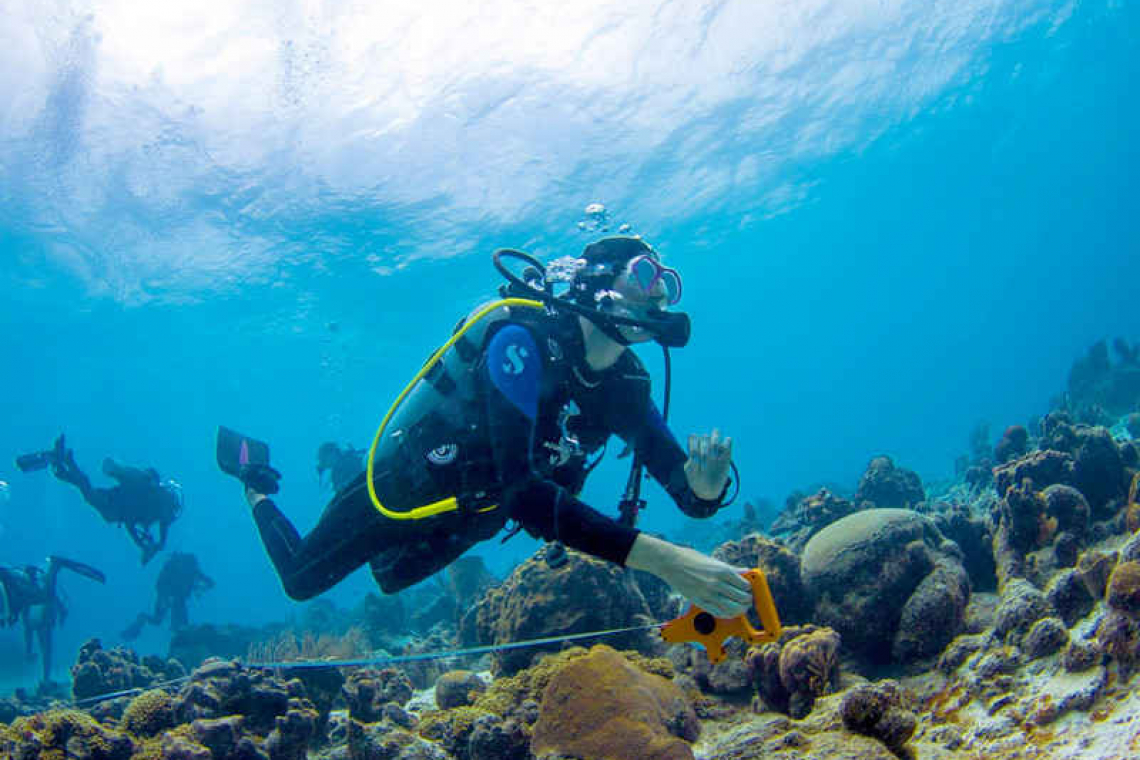Measurements are conducted along a transect line. In photo: Melanie Meijer zu Schlochtern.
COLE BAY--Nature Foundation St. Maarten once again scientifically monitored the state of the country’s coral reefs to determine coral reef changes over the years, with the assistance of its parent organisation Dutch Caribbean Nature Alliance (DCNA) and DCNA director Tadzio Bervoets.
Ocean Explorers Dive Center lent their boat to Nature Foundation staff, as its own boat is being repaired.
Each year reef monitoring is conducted according to the Global Coral Reef Monitoring Network (GCRMN) Caribbean scientific monitoring methods, in order to determine the health, composition and state of the coral reef.
The Foundation is worried about the current state of the reefs surrounding St. Maarten, as large amounts of wastewater ending up in the ocean, along with Stony Coral Tissue Loss Disease (SCTLD), is threatening their existence and recovery.
Additional coral protection and restoration, along with proper wastewater treatment, is needed to ensure the continued existence of the reef.
“We have seen major deterioration of our coral reefs,” said Foundation Manager Melanie Meijer zu Schlochtern, explaining that SCTLD has already killed many large colonies. Once healthy reefs are now dead coral, covered in algae. Wastewater contamination results in algae blooms and the smothering of coral, essential habitats for marine life, she further stated.
Data collected over the coming months will allow for comparison to previous years, helping the Foundation determine the scope of coral reef decline. The survey focused mainly on dive sites in the Man of War Shoal Marine Protected Area and other important dive sites around the island.
“All measurements are conducted along a transect line and repeated five times on one dive site,” the Foundation explains. “First, abundance and biomass of all fish species is determined, secondly the cover of reef organisms (corals) are analysed based on photo quadrats made during the dives, and photo quadrats are assessed for coral health.
“Monitoring is also done looking for coral recruitments (juvenile corals) and algae coverage and height. Lastly, invertebrate species (sea urchins, sea cucumbers, lobster and conch) are counted, and water quality is measured. These measurements will help us to better understand our reefs and to determine if our reefs are doing well.”
The reef is critical to the island’s economy. Studies conducted by the Nature Foundation have shown that reefs contribute about USD $50 million to our economy annually, so it is critical to know their status and their ecological function after experiencing the strongest hurricanes on record and the most destructive coral disease, SCTLD.
DCNA supported the Nature Foundation by sponsoring the expert assistance from its Director Tadzio Bervoets, who performed the fish surveys and covered fuel expenses for the vessel.







